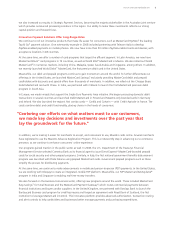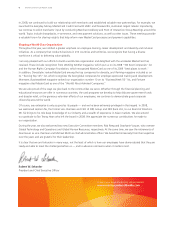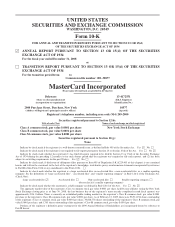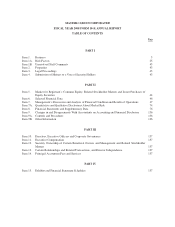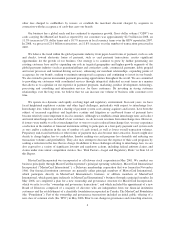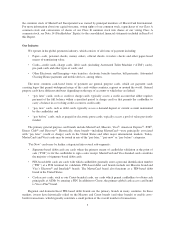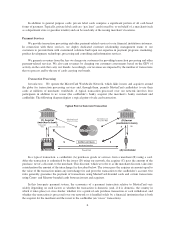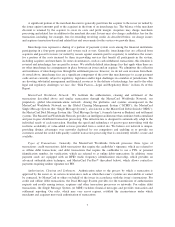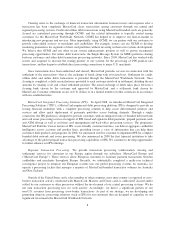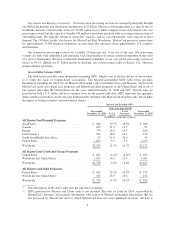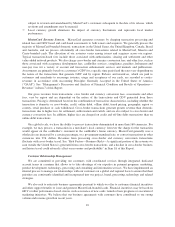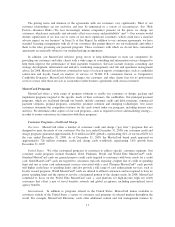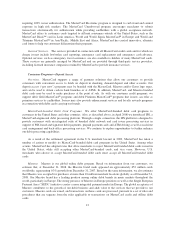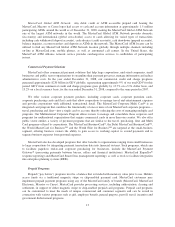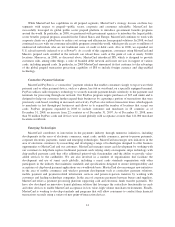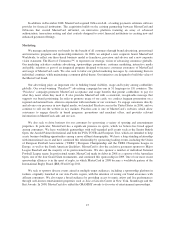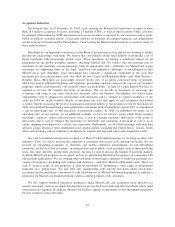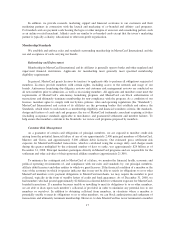MasterCard 2008 Annual Report Download - page 17
Download and view the complete annual report
Please find page 17 of the 2008 MasterCard annual report below. You can navigate through the pages in the report by either clicking on the pages listed below, or by using the keyword search tool below to find specific information within the annual report.A significant portion of the merchant discount is generally paid from the acquirer to the issuer (or netted by
the issuer against amounts paid to the acquirer) in the form of an interchange fee. The balance of the merchant
discount is retained by the acquirer to cover its costs and profit margin. Acquirers may charge merchants
processing and related fees in addition to the merchant discount. Issuers may also charge cardholders fees for the
transaction, including, for example, fees for extending revolving credit. As described below, we charge issuers
and acquirers transaction-based and related fees and assessments for the services we provide them.
Interchange fees represent a sharing of a portion of payment system costs among the financial institutions
participating in a four-party payment card system such as ours. Generally, interchange fees are collected from
acquirers and passed to issuers (or netted by issuers against amounts paid to acquirers) to reimburse the issuers
for a portion of the costs incurred by them in providing services that benefit all participants in the system,
including acquirers and merchants. In some circumstances, such as cash withdrawal transactions, this situation is
reversed and interchange fees are paid by issuers. We establish default interchange fees that apply when there are
no other interchange fee arrangements in place between an issuer and an acquirer. We administer the collection
and remittance of interchange fees through the settlement process; however, we do not earn revenues from them.
As noted above, interchange fees are a significant component of the costs that merchants pay to accept payment
cards and are currently subject to regulatory, legislative and/or legal challenges in a number of jurisdictions. We
are devoting substantial management and financial resources to the defense of interchange fees and to the other
legal and regulatory challenges we face. See “Risk Factors—Legal and Regulatory Risks” in Item 1A of this
Report.
MasterCard Worldwide Network. We facilitate the authorization, clearing and settlement of the
transactions described above and similar transactions through the MasterCard Worldwide Network, our
proprietary, global telecommunications network. Among the platforms and systems encompassed in the
MasterCard Worldwide Network are the Global Clearing Management System (“GCMS”); the MasterCard
Single Message System (the “Single Message System”), also known as the MasterCard Debit Switch (“MDS”);
the MasterCard Dual Message System (the “Dual Message System”), formerly known as Banknet; and settlement
systems. The MasterCard Worldwide Network provides an intelligent architecture that combines both centralized
and peer-to-peer distributed transaction processing. This infrastructure is designed to automatically adapt to the
individual needs of each transaction, blending the speed and redundancy of peer-to-peer networking with the
real-time availability of value-added services provided from a central site. We believe our network is unique,
providing distinct advantages over networks deployed by our competitors and enabling us to provide our
customers around the world with quality scalable transaction processing that is consistently reliable, secure and
available.
Types of Transactions. Generally, the MasterCard Worldwide Network processes three types of
transactions: credit transactions; debit transactions that require the cardholder’s signature, which are referred to
as offline debit transactions; and debit transactions that require the cardholder to use a PIN, or personal
identification number, for verification, which are referred to as online debit transactions. In addition, some
payment cards are equipped with an RFID (radio frequency identification) microchip, which provides an
advanced authentification technique, and MasterCard PayPass®(described below), which allows contactless
payments requiring neither signature nor PIN.
Authorization, Clearing and Settlement. Authorization refers to the process by which a transaction is
approved by the issuer or, in certain circumstances such as when the issuer’s systems are unavailable or cannot
be contacted, by MasterCard or others on behalf of the issuer in accordance with the issuer’s instructions. For
credit and offline debit transactions, the Dual Message System provides for the transmission of authorization
requests and results among issuers, acquirers and other transaction processors or networks. For online debit
transactions, the Single Message System (or MDS) switches financial messages and provides transaction and
settlement reporting. Our rules, which may vary across regions, establish the circumstances under which
merchants and acquirers must seek authorization of transactions.
7


